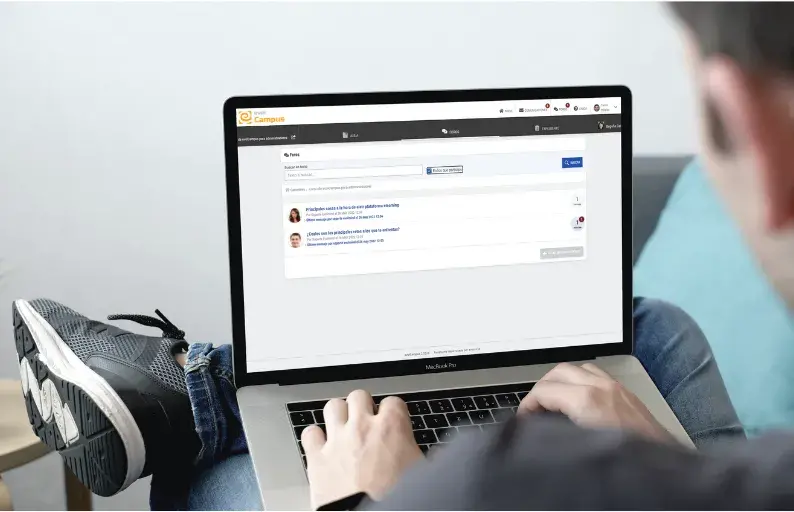In e-learning, we have all heard different names for teachers depending on the role they play: tutor, counselor, facilitator, mentor, motivator, coordinator and their role can be very different. We will explain the key roles of a elearning teacher below which are always within the framework of e-learning training
Key roles of a teacher in online teaching platforms

Guide the student
For some learners this will be their first online training.
One of the principles for teachers in online learning is to make sure you guide them from the beginning to the end so that they can see the advantages and benefits of this learning modality.
Show them the steps, ranging from how to use and access the tools, to how to organise themselves in order to successfully complete the evaluation of the course.
Facilitate learning
Another key role of a teacher in virtual classroom is the effort they must make to be innovative in their teaching methodologies without imitating what has been done previously in the classroom.
Being an expert in your subject is no longer enough. You have to know how to transfer your knowledge and experience in a different way in the classroom and in the online format.
Thus, for e-learning training, teachers should take advantage of existing tools to make courses more dynamic, by encouraging the use of different resources and activities: reading, audiovisuals, gamification or other practical exercises that help to maintain interest and encourage self-learning.
Motivate

For an effective online teaching, you should reinforce the emotional part of learning so that students remain interested and have a good attitude towards learning from the beginning to the end of the course.
To do this, we would recommend, as a role of online educator, for example, that you provide your learners with clear course objectives and a timetable with deadlines.
Don’t forget to also provide them with feedback that will serve as both learning and support, which will help them to feel guided during the learning process on their own, something that often causes some learners to drop out of the course. It is also important to respect their learning speed so that they can experience one of the main benefits of online training: flexibility.
Energise
Depending on the duration of the course, energising will be key to the success and satisfaction of the learners. For the effectiveness of online teaching, you should generate a direct discussion with your students to solve their doubts or provide feedback in a friendly and trusting environment.
A good time to inform them about the communication channels they can use to get in touch with you is at the beginning of the course. The most common options are tools such as chatting or videoconferencing for individual tutorials.
Moderate

Just as it is necessary to encourage participation, it is also necessary to moderate all those discussions that are generated in group debates and forums to take advantage of collaborative learning among students. There are also key roles of a teacher.
Create an atmosphere of discussion that leads to reflection and sharing of ideas so that students can feel involved in their learning process.
Don’t forget to always ensure, during your virtual teaching, that it is a space of respect and non-judgmental listening, so that everyone can feel free to express their opinion. Introduce new concepts, encourage discussion and give feedback on interventions to reinforce participation.
Follow up
On students’ progress in an environment of flexibility, familiarity and respect, taking into account individual differences: participation in forums, content, connection times, number of logins, etc.
Make sure, when remote teaching, you also make contact on an individual level to monitor progress, motivate and ensure completion of the online course.
Evaluate

The learners following the criteria previously mentioned in each of the modules of the syllabus.
Correcting and providing feedback according to the activity carried out by the students will be essential for their motivation and as a way of confirming whether or not the knowledge has been mastered correctly.
In short, teaching online classes will be also in charge of organising the agenda, sharing knowledge, creating a stimulating environment for student participation, monitoring, answering questions and evaluating.
All these key roles of a teacher may seem overwhelming, especially if you have a large number of learners, but nowadays they are made easier thanks to e-learning platforms, such as evolCampus, where all this course activity is centralised, saving time and effort for teachers and administrators.
